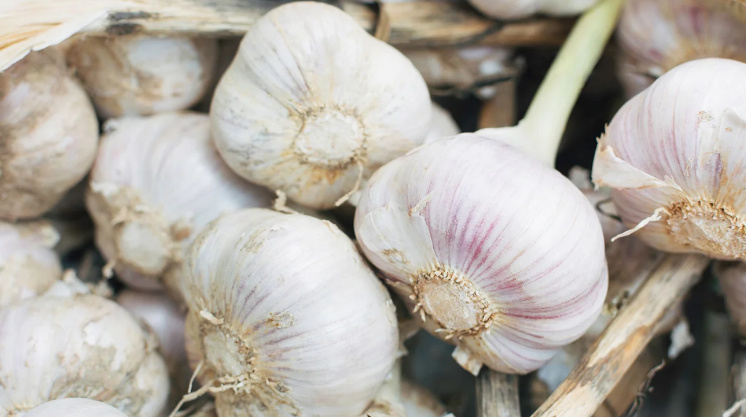Those words hail from the renowned ancient Greek physician Hippocrates, often hailed as the father of Western medicine.
He advocated for the use of garlic to address various medical conditions — a stance that modern science has substantiated with evidence of its numerous health benefits.
Garlic harbours compounds boasting potent medicinal properties.
Belonging to the Allium (onion) family, garlic shares its lineage with onions, shallots, and leeks.
Each segment of a garlic bulb is referred to as a clove, typically numbering around 10–20 cloves per bulb.
Garlic thrives in many regions worldwide and enjoys popularity in culinary circles due to its pungent aroma and delightful flavour.
Throughout antiquity, garlic was widely employed for its medicinal virtues, as documented across various major civilizations, including the Egyptians, Greeks, Romans, Chinese, and Indians.
Modern scientists have determined that garlic owes much of its health benefits to the formation of sulfur compounds when its cloves are chopped, crushed, or chewed.
Among these compounds, allicin stands out, although it’s fleeting, present only briefly in fresh garlic after it’s been cut or crushed.
Garlic packs a nutritional punch while being light on calories.
In terms of nutrition, garlic is remarkably rich. A single clove (approximately 3 grams) contains 4.5 calories, 0.2 grams of protein, and 1 gram of carbohydrates.
Garlic may contribute to fending off illness, including the common cold.
Research indicates that individuals who supplemented with aged garlic extract (AGE) for three months during the cold and flu season experienced milder symptoms and fewer missed days of school or work.
Moreover, other studies suggest that garlic compounds may possess antiviral properties, potentially bolstering the immune system and impeding viral entry or replication within host cells.
The active constituents in garlic have been associated with lowering blood pressure.
According to the World Health Organization, cardiovascular diseases like heart attacks and strokes claim more lives than almost any other condition.
High blood pressure, or hypertension, stands as a significant risk factor for these ailments.
A meta-analysis from 2020 found that garlic supplements reduced blood pressure in individuals with hypertension, potentially decreasing the risk of cardiovascular events by 16–40%. Notably, the effect was comparable to certain blood pressure medications but with fewer side effects.
Garlic contributes to improving cholesterol levels, potentially mitigating the risk of heart disease.
A 2018 review of research suggests that garlic can lower both total and LDL (bad) cholesterol levels. While the authors recommend increased garlic consumption for individuals with high cholesterol, they note the necessity for further research to confirm these findings.
Additionally, a 2016 study found that taking garlic supplements for over two months could decrease LDL cholesterol by up to 10%, particularly in individuals with slightly elevated cholesterol levels.
Garlic contains antioxidants that may aid in preventing Alzheimer’s disease and dementia.
Oxidative damage caused by free radicals contributes to age-related cognitive decline.
Garlic is rich in antioxidants that support the body’s defence mechanisms against oxidative stress. Studies propose that these antioxidants can significantly reduce oxidative damage and lower the risk of related diseases, such as Alzheimer’s disease, the most prevalent form of dementia.
Garlic may promote longevity.
Given its positive impact on crucial risk factors like blood pressure, it stands to reason that garlic consumption may extend lifespan.
A 2019 study from China found that older adults who consumed garlic weekly lived longer than those who consumed it less frequently. Additionally, the ability of garlic to defend against infectious diseases is noteworthy, as these ailments are common causes of death, particularly among older adults or individuals with compromised immune systems.
Garlic supplements might enhance athletic performance.
Ancient societies relied on garlic to combat fatigue and enhance the endurance of labourers. Olympic athletes in ancient Greece consumed garlic to improve their athletic prowess.
While animal studies have demonstrated garlic’s potential to enhance exercise performance, human studies remain limited.
In summary, garlic’s medicinal properties have been revered for millennia, a belief now substantiated by science.
Garlic is generally safe and beneficial for most individuals. However, if you’re taking blood thinners, it’s advisable to consult with a healthcare professional before significantly increasing your garlic intake.
- Ultimate CBD Bath Bombs and Self-Care Review: Relaxation and Relief Unveiled! - August 3, 2024
- Embark on a Vaping Adventure: My Personal Experience with the Vessel Expedition Series - July 9, 2024
- 11 Proven Health Benefits of Garlic - April 26, 2024

